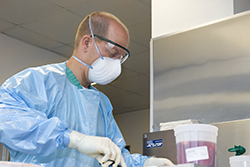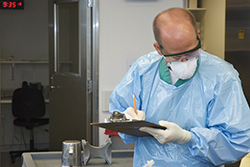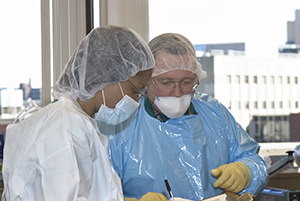Forensic Pathology
 Pathology is a medical specialty that concerns the diagnosis of disease through examination of body tissue and fluids.
Pathology is a medical specialty that concerns the diagnosis of disease through examination of body tissue and fluids.
There are two main branches of pathology – anatomic and clinical.
- Anatomic pathology involves examination of body tissues removed from the body.
- Clinical pathology evaluates body fluids. Areas of clinical pathology include chemistry, microbiology, hematology, and blood banking.
Forensic pathology is a subspecialty of pathology that applies the techniques of anatomic and clinical pathology to legal issues.
Job Requirements:
- Medical degree (MD or DO)
Most of the physicians at the Medical Examiner’s Office have Bachelor’s degrees as well as Medical degrees. - Anatomic (and Clinical) Pathology residency
Although Clinical Pathology is not a requirement for board certification in Forensics, most of the physicians at the Medical Examiner’s Office are trained in Clinical Pathology (requiring an extra year) - Forensic Pathology Fellowship
An additional 1-2 years of intensive training. - Board certification through the American Board of Pathology in Anatomic (and Clinical) Pathology and Forensic Pathology
Board certification assures that the physician has successfully completed training at an accredited institution and has passed an examination covering those areas of study, thus demonstrating competency in their area of expertise.
Deputy Medical Examiner:
 The Department of Pathology is staffed by eight full-time physicians who are Board Certified Forensic Pathologists (or have extensive experience) and 1 – 2 physicians
that are training in forensic pathology (fellows). All of the physicians are appointed as Deputy Medical Examiners and assist the Medical Examiner in his medical duties.
The Department of Pathology is staffed by eight full-time physicians who are Board Certified Forensic Pathologists (or have extensive experience) and 1 – 2 physicians
that are training in forensic pathology (fellows). All of the physicians are appointed as Deputy Medical Examiners and assist the Medical Examiner in his medical duties.
The primary duty of the Deputy Medical Examiner is to perform autopsies to determine the cause and manner of death.
Additional duties include:
- Testifying in court in both criminal and civil cases
- Teaching medical students, hospital pathology residents and other groups
- Occasional examination of death scenes.
Determination of cause and manner of death is an involved process that can take anywhere from a few days to months, depending on how complicated the case.
Most bodies that come to the Medical Examiner’s Office do not require an autopsy. These bodies are examined externally only. Those cases that meet certain criteria are autopsied the same or next day.
The autopsy consists of three main components
- Gross examination of the body (looking at the body and organs with the naked eye)
- Microscopic examination (examining tissue biopsies under the microscope)
- Toxicological examination (testing body fluids for prescription and over-the-counter medications as well as street drugs).
 To formulate the cause and manner of death, the pathologist will combine the findings of the autopsy with investigative information.
To formulate the cause and manner of death, the pathologist will combine the findings of the autopsy with investigative information.
Investigative information includes the Medical Examiner’s Investigator report, scene photographs, medical records, police records, trace evidence findings, consultant’s findings, special test results, etc. The manner of death consists of five categories – natural, accidental, suicide, homicide, and undetermined.
The Cuyahoga County Medical Examiner’s Office’s Deputy Medical Examiners work closely with families, police, prosecutors, defense attorneys, and other county Medical Examiner's to provide accurate death certification.
Do you have an interest in becoming a forensic pathologist? Learn about our Forensic Pathology Fellowship.
Forensic Pathologists
Dr. Thomas P. Gilson, M.D.
Chief Medical Examiner
Dr. Joseph Felo, D.O.
Deputy Chief Medical Examiner
Dr. David Dolinak, M.D.
Deputy Medical Examiner
Dr. Erica J. Armstrong, M.D.
Deputy Medical Examiner
Dr. Andrea McCollom, M.D.
Deputy Medical Examiner
Dr. David Galita, M.D.
Deputy Medical Examiner
Dr. Elizabeth Mooney, D.O.
Deputy Medical Examiner
Dr. Todd M. Barr, M.D.
Deputy Medical Examiner
How could we make it better?
Please leave a comment before submitting.
Thank you for your feedback
Your feedback means a lot to us. We use it to improve the experience of all of our users.
 An official website of the Cuyahoga County government. Here’s how you know
An official website of the Cuyahoga County government. Here’s how you know


